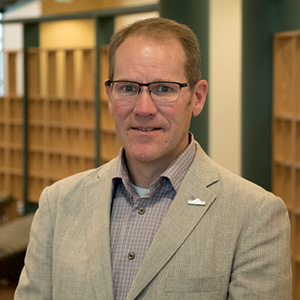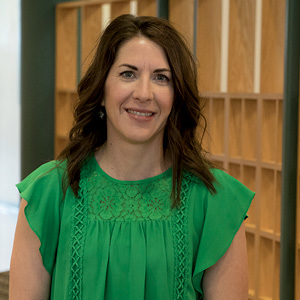MBA program is moving online
CMU has offered the Master of Business Administration degree in a traditional, evening format on campus for more than 20 years, making it convenient for working professionals to advance their education and careers. As a result of technology’s growing role in higher education, CMU is making an even greater effort at meeting students where they are.
Starting fall 2019, students starting their MBA program will be able to complete all of their courses online. In fall 2020, the program will shift to an entirely online format.
“I’m a believer that we need to take education where the learners are and with technology nowadays we can do some really great things with teaching and learning online,” said Associate Professor of Business and MBA Program Coordinator Kyle Stone, PhD.

Kyle Stone, PhD, associate professor
of business and MBA program coordinator
The current program requires students to come to campus three to four nights a week for at least two years, which is difficult for working professionals or those raising children. The new online format will provide students from all over the country the flexibility to pursue a degree on their own time.
“We heard from a lot of community members and businesses and we’re ready to shift this over to online because we have the technology and skillset within our faculty, and we have the interest from our students,” Stone said.
Paul Gardner, ’16, was 43-years-old when he started the MBA program in 2013. He already had a master’s of engineering degree from the University of Michigan, a family and full-time career at Reynolds Polymer, a Grand Junction engineering firm.
“I liked that it (the program) was after hours — that made it possible, but it also made for long nights,” he said.
Gardner decided to pursue his MBA after being approached with the opportunity to grow within the company. Now the vice president of engineering, Gardner said his MBA equipped him with the knowledge and helped him build the confidence necessary to be involved in strategic business decisions.

Paul Gardner had a master’s of
engineering degree and added an MBA
“I’m an engineer by trade, so being that my other degrees were engineering degrees, it was very helpful to round out my knowledge with accounting, finance and marketing,” Gardner said.
Although the delivery method will change with the program’s migration online, Stone said the learning objectives will not. Qualified faculty members will still teach students to research and analyze data using applied practices.
Tawny Espinoza, ‘01, ’03, had just graduated from Mesa with undergraduate degrees in exercise science and corporate fitness when she enrolled in the MBA program.
“I knew I wanted to further my education, but what I was trying to decide was what would be the best career decision for me,” said Espinoza. “I spoke to a lot of different people in the health care world, which I didn’t even realize I’d get into someday, and that was the advice I was given. It just made sense because business is in everything.”

Tawny Espinoza said earning
a MBA helped her promotion to
vice president of business development
Espinoza worked for Mesa County Public Health and helped create LiveWell Colorado, a health and wellness initiative offered statewide. Years later, she began working at Community Hospital as a health coach, was promoted to department director and is now the vice president of business development.
“I think it was an easier decision for my boss to promote internally,” she said. “I don’t think that would’ve happened if I didn’t have my MBA.”
Stone said CMU MBA graduates have a nearly 100% placement rate.
“If they’re not already in jobs, they have jobs waiting for them when they’re getting ready to graduate,” he said.
Time is not the only commitment students have to consider when researching advanced degree programs.
“Our graduate tuition rate is extremely competitive compared to other universities,” said Stone. “There’s no tuition differential with in-state or out-of-state tuition. All of our classes are taught by PhD or graduate-qualified faculty, and most of them have current or relevant industry experience.”
Gardner and Espinoza both appreciated the small class sizes and one-on-one camaraderie with professors and students, which is something Stone said the university is working to include with the degree moving online.
“If anything, online helps them hone these skills even more — things like video conference calls, virtual presentations and learning to work across multiple time zones is pretty common in business in the 21st century,” said Stone. “And you still have resources available virtually, along with the support of a great university.” •